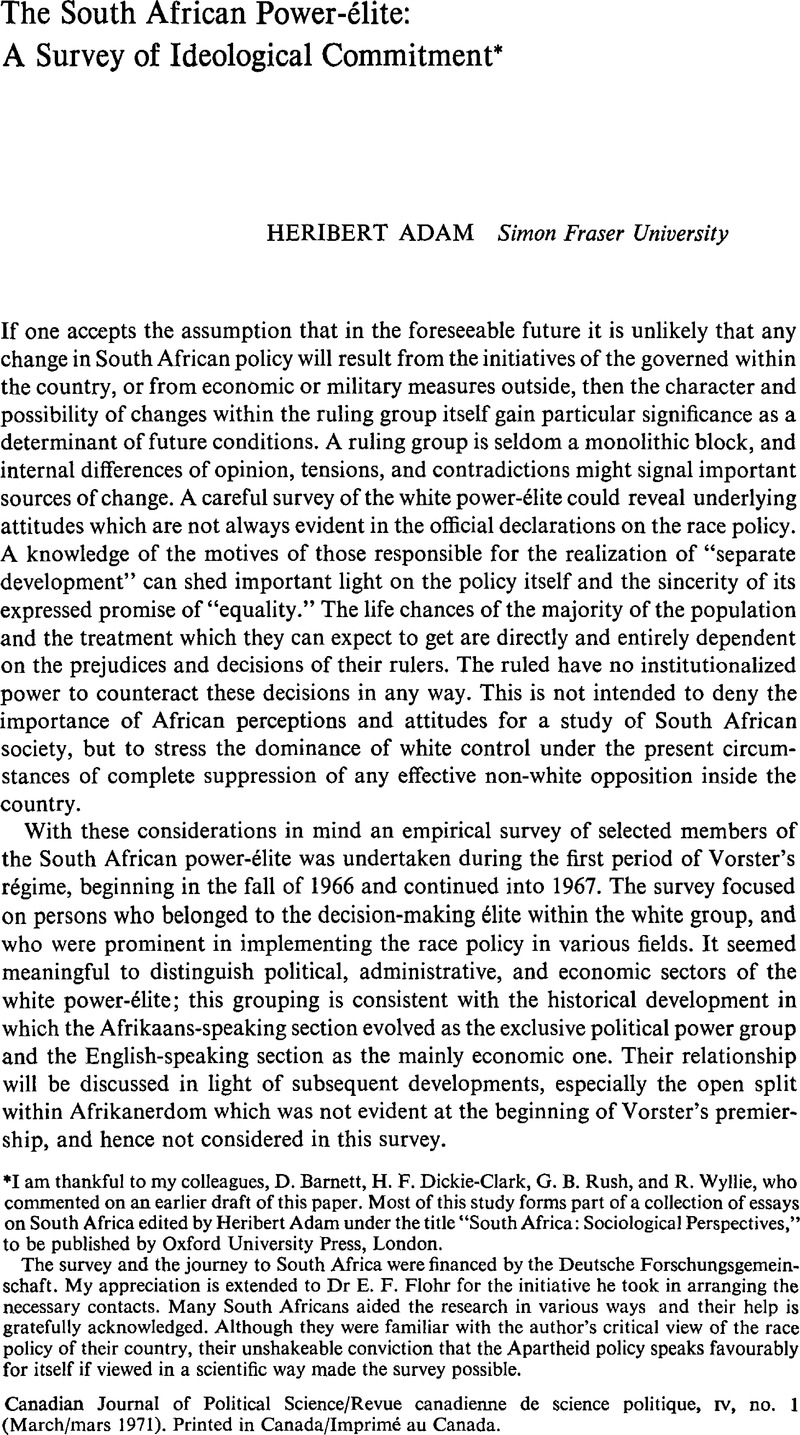Article contents
The South African Power-élite: A Survey of Ideological Commitment*
Published online by Cambridge University Press: 10 November 2009
Abstract

- Type
- Articles
- Information
- Canadian Journal of Political Science/Revue canadienne de science politique , Volume 4 , Issue 1 , March 1971 , pp. 76 - 96
- Copyright
- Copyright © Canadian Political Science Association (l'Association canadienne de science politique) and/et la Société québécoise de science politique 1971
References
1 Many studies emphasize the idealistic and paternalistic dedication of South Africa's domestic colonial officers, devoted to the unsolvable task of “preparing the natives for self-government fifty years too late,” as Brown, Douglas states in Against the World: A Study of White South African Attitudes (London, 1966), 115.Google Scholar It is this group whose attitudes would seem to be the most relevant in the context of this study.
2 van der Merwe, Hendrik W., “Race and Politics among the White South African Elite,” unpublished paper intended for presentation at the annual meeting of the African Studies Association in Montreal, 1969.Google Scholar
3 Hansard, June 16, 1966, col. 2185–95.
4 Macrae, Norman “What Will Destroy Apartheid?” Harpers Magazine, March 1970, p. 40.Google Scholar
5 All statements about significant differences in this report are based on greater than the 0.05 level of confidence.
6 Previously Pierre van den Berghe has emphasized this paternalistic approach in contrast to the opinion which ascribes to the South African fascistic features. See Africa: Social Problems of Change and Conflict, ed. Berghe, Van Den (San Francisco, 1965), 502.Google Scholar Also by the same author, South Africa: A Study in Conflict (Middletown, Conn., 1965).
7 “Personality and Sociocultural Factors in Intergroup Attitudes,” Journal of Conflict Resolution, II (1958), 29–42.
8 Van den Berghe, South Africa, 274.
9 Horowitz, Ralph, The Political Economy of South Africa (London, 1967), 427.Google Scholar
10 “Industrialization and Race Relations,” in Hunter, Guy, ed., Industrialization and Race Relations (London, 1965), 252.Google Scholar
11 Ibid.
12 Tiryakian, Edward A., “Sociological Realism: Partition for South Africa?” Social Forces, XLVI, no. 2 (1967), 208–21.CrossRefGoogle Scholar
13 Turk, Austin F., “The Futures of South Africa,” Social Forces, XLV (1967), 402–12.CrossRefGoogle Scholar
14 Carter, G., Karis, Thomas, and Stultz, N. M., South Africa's Transkei: The Politics of Domestic Colonialism (Evanston, Ill., 1967), 181.Google Scholar
15 It is assumed that Afrikaner capital now controls 9 per cent of the mining industry, 37 per cent of the iron production, 20 per cent of the coal, and 32 per cent of the asbestos production. Sunday Times, Johannesburg, April 9, 1967. Other assessments claim the Afrikaner part in commerce is 28 per cent, in the bank sector 14 per cent, and in secondary industry 9 per cent. Newscheck, Nov. 24, 1968.
16 Die Vaderland, Sept. 8, 1969.
17 See Die Beeld, June 14, 1970, in the case of playwright Athol Fugard.
18 Dagbreek en Landstem, Sept. 13, 1970.
19 Ibid.
- 2
- Cited by




